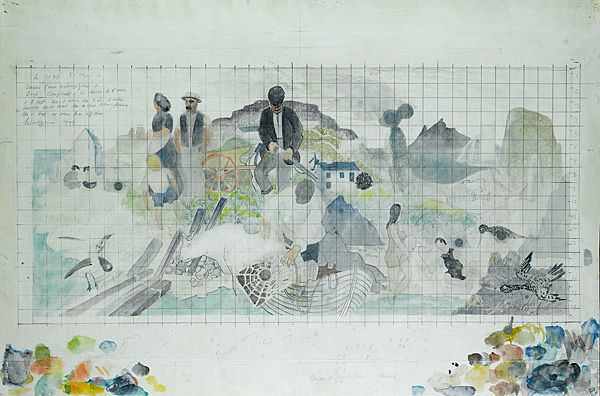

 Hover over the painting to magnify (there may be an initial delay while the magnified image is loaded)
Hover over the painting to magnify (there may be an initial delay while the magnified image is loaded)Gilbert Spencer (1892-1979):
Study for Hebridean Memory, 1951
Framed (ref: 5559)
Signed in pencil, Gilbert Spencer (br) and titled, Hebridean Memory (lower margin)
Watercolour, pen and ink, pencil on paper, squared for transfer in
pencil.
See all works by Gilbert Spencer ink pen and ink pencil watercolour big pictures murals Gilbert Spencer Murals catalogue
Annotated and further signed in pencil by the artist on the occasion of
the work being given to the previous owner in 1973; In 1938 we stayed
on Canna (Inner Hebrides) with the Laird Campbell and his wife for 6
weeks & I felt that I would like to do...(inscription unreadable)...island
floating like a boat as seen from offshore’
Annotations and colour trials in the lower margin.
Pencil drawing verso.
Provenance: A gift from the artist to the previous owner in 1973.
Gilbert Spencer painted Hebridean Memory, a landscape set on the small Island of Canna in the Scottish Inner Hebrides. He had holidayed there in 1947, staying with John Lorne Campbell who had bought Canna outright in 1938, and was now living there as its Laird with his wife
Margaret in the prominent harbour property Canna House. Spencer and Campbell had been friends since the 1930s when they met in Oxford, where Spencer had been painting a series of murals depicting the Foundation of Bailliol College and Campbell was doing post-graduate work.
Hebridean Memory depicts several of Canna’s landmarks and the locals going about island activities – farming and lobster and mackerel
fishing – whilst visitors sunbathe. Rum features in the distance with MacBrayne’s steamer on its way over. A vision of contentment and plenty, the only incongruity is the man with the gun: Campbell, who wanted the island to be a sanctuary for wildlife, did not allow shooting. The composition also includes a whimsical depiction in the right foreground of the artist and his older brother Stanley as their younger selves.
Spencer has written about the trials of working on such a large-scale canvas, and that Hebridean Memory took him three years (with several incarnations) to achieve. After ‘Sixty Paintings for 51’ it was shown at the RA in 1955, but this is the first time it has been exhibited since then.
 British Murals
British Murals




